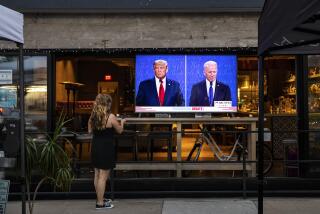Cable industry needs to stop its noise over law on loud TV ads
A new federal law intended to keep TV commercials from bursting your eardrums won’t take effect until Dec. 13. But the cable industry already is trying to water it down.
The Commercial Advertisement Loudness Mitigation Act, or CALM Act, requires that TV commercials be no louder than the programs they accompany. It’s up to the Federal Communications Commission to set and enforce the new rules.
The broadcasting industry has long maintained that it doesn’t really jack up the volume when ads come on, arguing that it only seems as if the decibel level has soared because certain attention-getting sounds are being used.
But common sense and the United States Congress say otherwise. Rep. Anna G. Eshoo (D-Menlo Park), the bill’s original sponsor, says the CALM Act is the single most popular piece of legislation she’s introduced in her nearly two decades on Capitol Hill.
Nevertheless, the cable industry still can’t get its head around the idea that TV viewers should be able to watch the tube at the volume of their own choosing.
The National Cable & Telecommunications Assn., an industry group, has submitted a petition to the FCC asking for an exemption from the CALM Act for “promotional material.”
What’s that mean? Think about the end of a show or a movie, when your screen gets taken over by what’s basically a commercial for an upcoming program. There are frequently explosions or gunfire or people yelling at one another.
This is deliberate. All that hullabaloo is meant to get your attention and deter you from changing the channel. A quiet promo is a failed promo.
The cable industry is trying to distinguish between the new law’s regulation of commercial advertisements and a network’s own promos. As written, the law makes no such distinction.
“The commission mistakenly conflates commercial advertisements and promos, defining promos as ‘commercial advertisements promoting television programming,’” the association said in its petition.
“In fact, promos are distinct from commercial advertisements. Generally, commercial advertisements are material transmitted in exchange for some type of payment or remuneration, while promos are not.”
That’s only because TV networks don’t pay themselves to run their own commercials. For viewers, the distinction is meaningless.
A pitch for a new car is no different from a pitch for a new show. Both have an identical goal: to get you to be a willing consumer of the product.
In other words, an ad by any other name would sound as loud.
Rep. Eshoo certainly thinks so.
“The distinction between promotional materials and other forms of advertising would not be readily apparent to a consumer and thus should not be treated differently in the context of the commission’s rules,” she said in a letter to FCC Chairman Julius Genachowski.
“The plain language of the law does not provide a blanket exemption from promotional advertisements, nor did legislative debate on this subject infer such an exemption,” Eshoo added.
Brian Dietz, a spokesman for the industry association, said broadcasters just want the rules to be fair.
“Cable companies are working hard to fully comply with the CALM Act and are simply trying to understand how the rules will be fairly applied,” he told me. “The FCC has already exempted public broadcasting stations that carry promotional announcements that are not considered to be commercials.
“We are simply asking the FCC to find that promos on other networks, like C-SPAN, should receive the same treatment.”
It’s an interesting argument, albeit a tad misleading.
The industry is basically saying that because PBS stations, such as KOCE-TV, are exempt from the loudness rule for promos, all stations should enjoy a similar get-out-of-jail-free card. The industry cites the example of C-SPAN.
First of all, it’s doubtful anyone has ever been blasted off their couch by promos for “Sesame Street” or House subcommittee hearings.
Most reasonable TV viewers would agree that PBS and C-SPAN are not the major offenders when it comes to commercial noise.
The real culprits where promos are concerned are the likes of FX and TNT, which seem to crank the knob up to 11 every time they’re pushing their cop shows or action movies.
It’s pretty simple: The CALM Act says TV viewers are entitled to watch programs without having to grab for the remote every few minutes because of noisy ads.
It doesn’t say that some ads can be louder than others. It says all ads have to be at roughly the same volume as the program they’re riding along with. And promos count as ads.
Congress has spoken. The American people have spoken.
Time for the cable industry to shut up and listen.
David Lazarus’ column runs Tuesdays and Fridays. He also can be seen daily on KTLA-TV Channel 5 and follows on Twitter @Davidlaz. Send tips or feedback to david.lazarus@latimes.com







